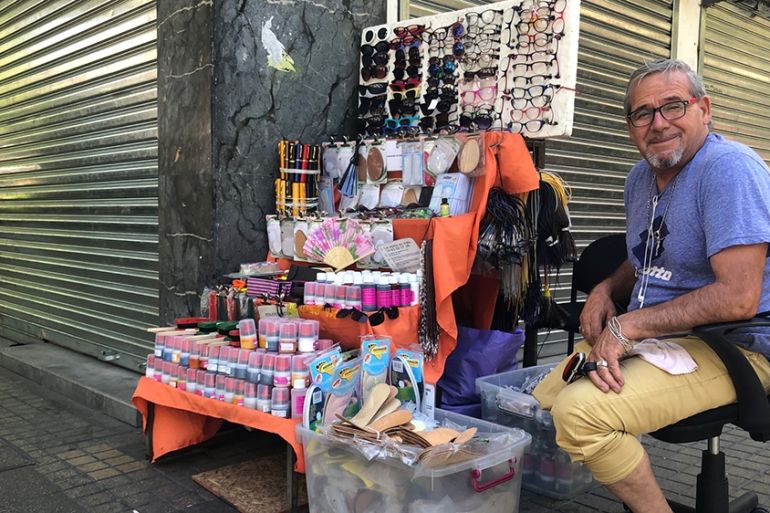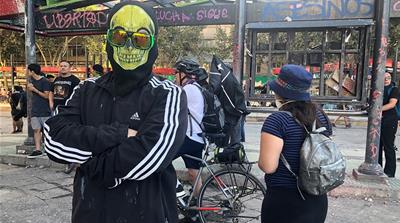Unrest is costing Chile’s economy, but protesters press on
Protesters and their supporters say short-term economic pain is necessary to meaningfully redress festering inequality.

Santiago, Chile – For 20 years, street vendor Luis Valenzuela has not budged from his corner on Providencia Avenue in Santiago. Even after the banks and pharmacies around him were destroyed in riots and boarded up, he has kept to his routine, selling cheap eyeglasses and other knick-knacks. Only now he makes three times less than he did before anti-government protests swept the country nearly two months ago.
“Since the mass demonstrations began, on October 18, business has been bad,” Valenzuela tells Al Jazeera. “People are forced to leave their offices early because the public transportation has been disrupted. So, of course, I sell less.”
Keep reading
list of 4 itemsParallel economy: How Russia is defying the West’s boycott
US House approves aid package worth billions for Ukraine, Israel
Ecuador weighs security, international arbitration in latest referendum
Cristina Soto, a custodial worker, has had her life thrown in chaos by the unrest. Her daily commute is three times longer and she can no longer shop for groceries after work because the stores in her neighbourhood were ransacked.
“The metro station I used to get off at was burned down, and after being looted, supermarkets in my neighbourhood no longer stay open until late,” she tells Al Jazeera.
Leoncio Carrasco is a tour guide in Chile‘s capital. Like others who depend on tourism, his livelihood has been derailed by images beaming around the globe of riot police and tanks dispersing protesters with water cannon, tear gas and pellets – only to have them return, with rocks and sling-shots day after day.
“I’ve had many cancellations,” Carrasco tells Al Jazeera. “People are afraid to come here because of the violence and cruise ships are bypassing Chile altogether.”
Though from different walks of life, Valenzuela, Soto and Carrasco are all suffering financially as a result of the protests. But like millions of their countrymen, they see the setback as a painful but necessary step for reforming free-market policies many feel are not working for the majority of Chileans.

From miracle to mess
A champion of free markets, Chile has for years been regarded as an economic success story – a middle-income country that has managed to rapidly reduce poverty from 30 percent at the start of this century to less than 7 percent by 2017.
But that stunning achievement has masked widespread frustration with festering income inequality and escalating living costs that exploded into anti-government protests that are currently hobbling day-to-day business.
In October, Chile’s economy suffered its worst monthly contraction in a decade, compelling the government to announce a $5.5bn recovery plan.
“But things will probably get worse before they get better”, says Francisco Castaneda, an economics professor at the University of Santiago. “Unemployment is expected to rise above 8 percent by the end of December and will probably reach 10 percent in the first months of 2020, adding to the growing dissatisfaction which has spurred the protests”, he tells Aljazeera.
The economic blow from protests also landed as external factors were already weighing on the country’s growth.
Chile is the world’s largest copper producer, but ebbing demand fuelled by the trade war between the United States and China had dragged on prices. In September, Chile’s central bank downgraded its estimate for economic growth this year from 3.5 percent to less than 3 percent. Last week, it slashed its forecast again – this time to a meagre 1 percent.
The outlook for next year is also darkening, with the central bank forecasting an anaemic growth range between 0.5 percent and 1.5 percent.

Attempts to assuage
At least 24 people have died since unrest broke out on October 18 and thousands have been arrested.
Rights groups have condemned Chile’s security forces for alleged human rights abuses including excessive use of force and abuses in detention.
Conservative President Sebastian Pinera tried unsuccessfully to stop the protests by declaring a state of emergency – the first since the country returned to democracy in 1990 – only to lift it 10 days later. He also asked the country’s legislators to deploy the military to protect vital infrastructure.
But Pinera has also attempted to assuage the protesters, introducing measures to raise the minimum wage, boost government subsidised pensions, lower medical bills, hold electricity costs steady and forgive up to 80 percent of fines incurred on toll roads – a serious barrier to simply driving or buying a car.
The $5.5bn package announced by the government on December 2 aims to double public spending next year and create a hundred thousand new jobs. Almost two billion dollars of the package is earmarked to help fund small and medium-sized enterprises which employ almost two-thirds of the workforce, says Castaneda.
A one-off $124 government-funded cash handout to more than a million needy families was also announced.
Insufficient
Gloria, a 22-year supermarket employee who asked Al Jazeera to change her name to protect her privacy, was laid off a month ago after her place of work was looted.
She talked to Al Jazeera at Ground Zero – the epicentre of protests in the Chilean capital, Santiago, having left her three-year-old baby with her mother-in-law to join her husband in the demonstration.
Her husband, Juan (also an alias) was wearing a green mask and goggles, to protect his face from tear gas and pepper spray – and to hide his identity.
“I come here almost every day after work because if we do not put pressure on the politicians, they will do what they have always done: throw us crumbs,” he tells Al Jazeera.
Like many educated youths, Juan is shouldering student loan debt. Chile has some of the highest university fees in the world.
The young couple scrapes by on his monthly wage of 500 thousand pesos ($625). A third of that, they say, goes towards rent on a small two-room apartment in a working-class neighbourhood on the outskirts of Santiago that has seen rents double with the arrival of immigrants from Colombia, Haiti and Venezuela.
“Demand for housing has gone up and slum lords take advantage of foreigners who can offer no rental collateral and are willing to pay more,” Gloria explains. “And then there are Juan’s student loans, our aging parents and our daughter’s schooling to deal with.”
Economist Manuel Agosin, professor at the University of Chile, says the measures announced by the government are insufficient to eliminate the pressure on Chileans like Juan and Gloria.
“This is only the beginning of an ambitious and necessary social agenda,” Agosin tells Al Jazeera. “But at least it’s a sign that the government is willing to address it.”
But many Chileans remain sceptical of the government’s motives, fearing the announced reforms are a ploy to simply get them off the streets.
Among them Valenzuela and Soto. Though neither of them participates in the protests, they support their children who do.
“We’ve put up with inequality for too long,” says Valenzuela. “Younger generations must fight for their future, if they want one.”